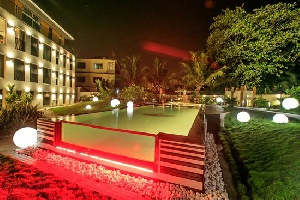 Red Mango Apartment Hotel located in Takoradi recently sponsored the National Readathon team.
Red Mango Apartment Hotel located in Takoradi recently sponsored the National Readathon team.
To enhance their standing in the market, a company, after a favourable cost-benefit-analysis, can embark on sponsorship in various arrears of public endeavour.
Selecting the most suitable event to sponsor depends on the consumer or lifestyle market a business caters to, so companies tend to seek opportunities that complement their marketing objectives.
What can be sponsored are a variety of activities or events; although in Ghanaian society sports, TV shows, concerts, visual and performance arts are activities which tend to receive the most sponsorship.
Music events, such as large-scale concerts or artist showcases, are some of the more popular arts and cultural sponsorships.
Selecting the right initiative, programme or event to sponsor is crucial, as audiences, attendees or viewers have become more fragmented by consumer and lifestyle choices.
In other words, the marketplace has become flooded with varieties of the same allowing consumers to develop nuanced or peculiar tastes.
The implication is that both sponsors and those being sponsored become more selective in their needs or interests respectively. To some extent the audiences also become more sophisticated in their expectations from these two.
Tourism businesses which would like to join the sponsorship bandwagon must take a cue from these realities. When a business sponsors, it has the opportunity to expose its critical identifiers to a wider audience.
Companies sponsoring large-scale concerts, for example can benefit from exposure by including their logos in concert promotional campaigns that may include billboards and signage, traditional advertisements, event brochures and promotional giveaways.
Truth of the matter is that it is not always that such blatant exposures are preferred by the sponsor. Events that cater to more mature or upscale audiences, such as the symphony orchestra or museums, usually have a more subdued form of publicity and exposure.
Logo inclusion; business names could be written subliminally on playbills or plaques, or assigned to designated rooms, wings or galleries.
When a tourism business is sponsoring it could consider areas that would attract its core market target (for example, sponsoring a travel writer to experience an attraction and report on it in a specific medium).
They could also sponsor a cause un-related to tourism only because they sympathise with or believe in that cause.
Indeed, the major feature of tourism sponsorships is their ability to transcend cultural, sports language, or even literary events.